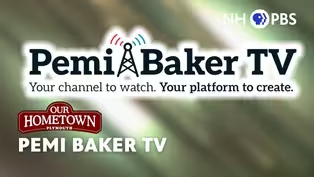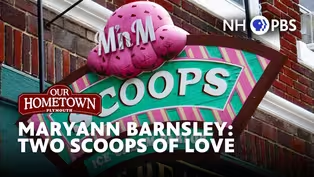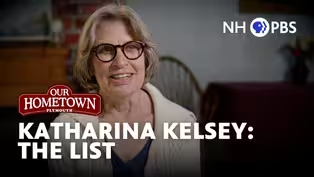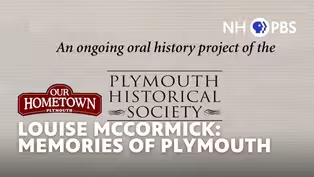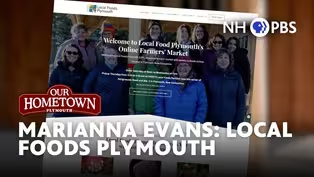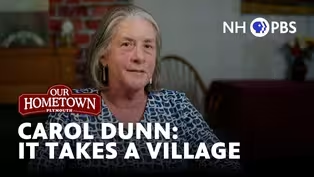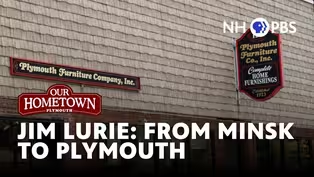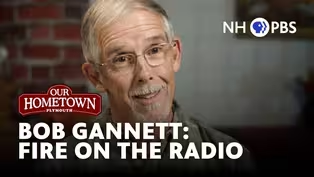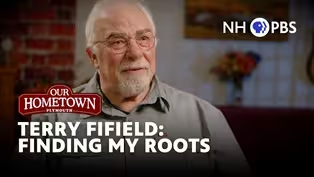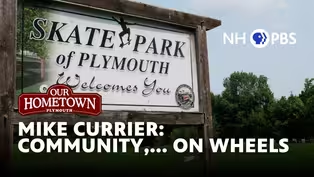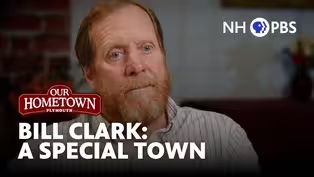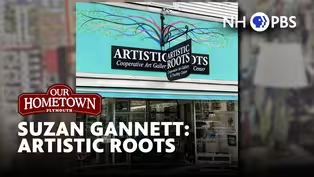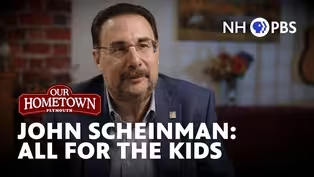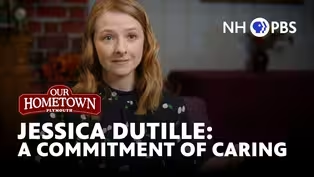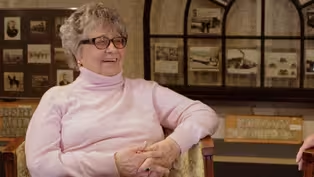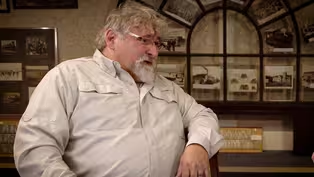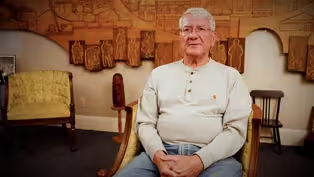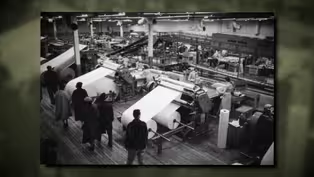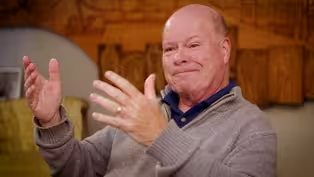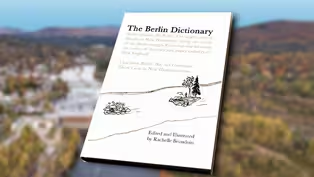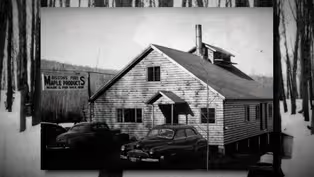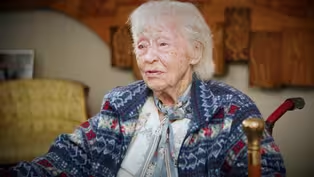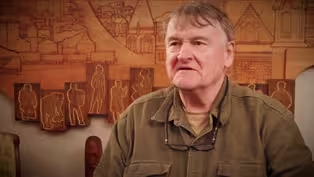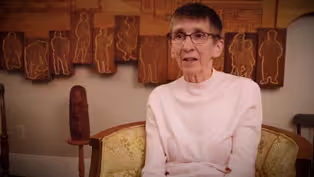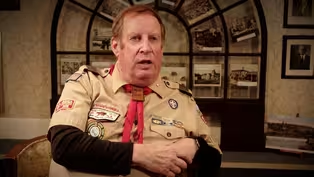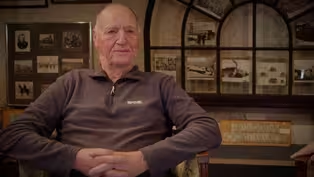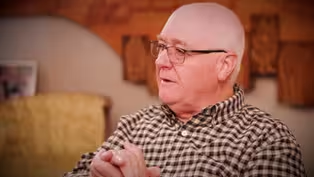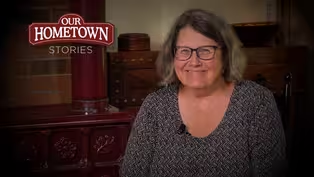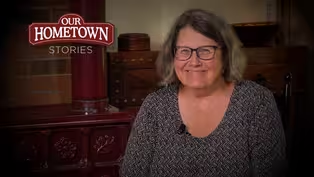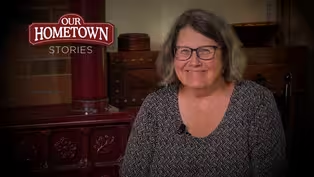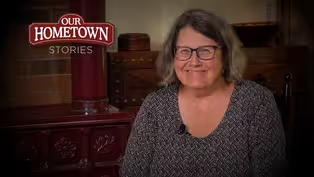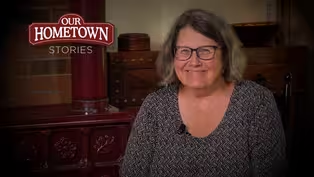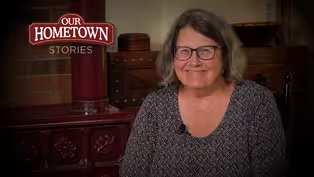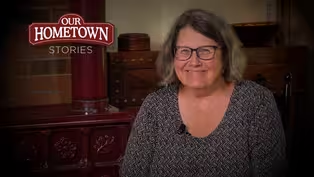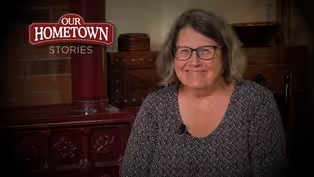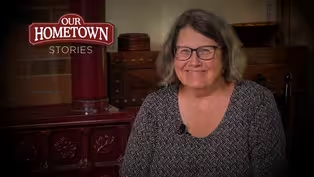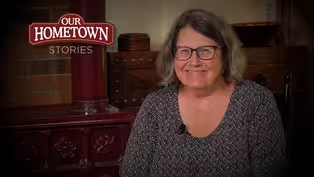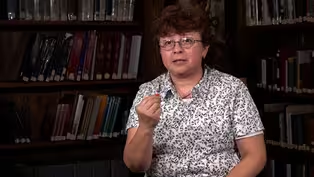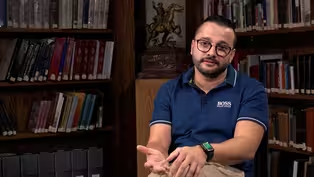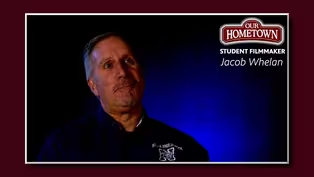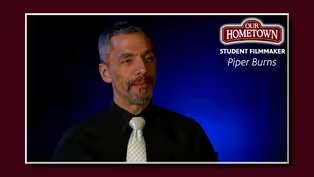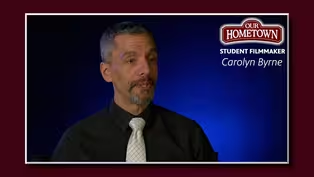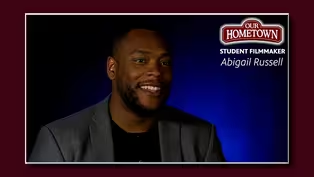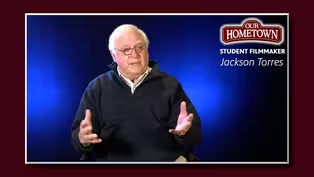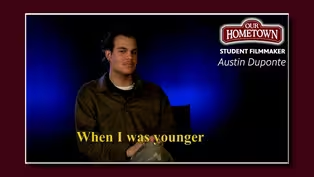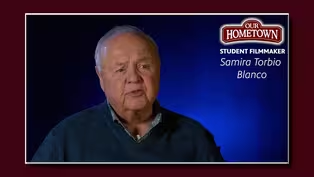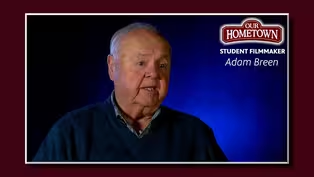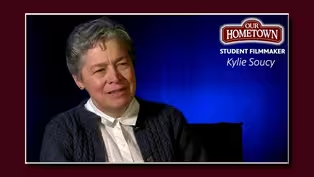Our Hometown
Berlin | Rachelle Beaudoin
Clip | 5m 37sVideo has Closed Captions
Berlin has a language all its own, and Rachelle decided to compile a dictionary of words.
Berlin has a language all its own, and Rachelle decided to compile a dictionary of words & phrases which are unique to this multi-ethnic city.
Problems playing video? | Closed Captioning Feedback
Problems playing video? | Closed Captioning Feedback
Our Hometown is a local public television program presented by NHPBS
Our Hometown
Berlin | Rachelle Beaudoin
Clip | 5m 37sVideo has Closed Captions
Berlin has a language all its own, and Rachelle decided to compile a dictionary of words & phrases which are unique to this multi-ethnic city.
Problems playing video? | Closed Captioning Feedback
How to Watch Our Hometown
Our Hometown is available to stream on pbs.org and the free PBS App, available on iPhone, Apple TV, Android TV, Android smartphones, Amazon Fire TV, Amazon Fire Tablet, Roku, Samsung Smart TV, and Vizio.
So I wanted to talk about this project I did in 2009 called the Berlin Dictionary, and I consider it an art project, but it is a self-published dictionary of words that are unique to Berlin, New Hampshire.
And I consider it an art project because it was really a collaboration.
And I sort of see myself as like the lead artist, organizer of something, and I just kind of pulled it out of the community, something that was already there.
So starting the process for this in 2008 or so, my husband and I were driving back and forth to Berlin a lot and we would often he grew up here as well.
We would often talk about these kind of Berlin words that we had.
So like, you've got this little muss, you have a little muss like on your shoulder, let me just take it.
And then we sort of realized, I think after we had left Berlin, that like not everyone knows what a muss is.
And somehow this seemed like funny to us and kind of unique, and that there were a lot of words like this, like piton means any kind of button, but kind of a button that you can't name.
Like just press that, you know, that that piton over there.
And so we thought like there might be enough of these to sort of get them together and make an actual book project out of them.
And I had a mentor, another artist I had known who had made a kind of alternative dictionary.
So this was kind of like floating around.
And I was in art school at the time.
So we decided just to start it up, like just to see if we could collect them.
And so we collected them the way you kind of do anything in Berlin, which is to stand outside one of the grocery stores called the IGA.
So when we were young, we would like stand out there and ask for money for Little League or sell candy bars or something.
So it's kind of like a known place where you might be busking, kind of like, for lack of a better word, you'd be standing out there tagging, asking for money.
So it's not unexpected that someone would be just kind of approaching you at the IGA and it's covered, so you can do it in any kind of weather.
So the first part of the project was just standing outside asking people if they had Berlin words and then having them write those words down.
we got a lot of submissions this way, like just, yeah, just knocking on doors and just asking people what are some of your Berlin words?
And then we got some press, I think, on NHPR, maybe even in the Union-Leader, that we were doing this project and collecting words and people started to mail them in, which is really awesome.
And one of them that I got that kind of surprised me was from my fifth grade teacher who I hadn't thought about in a really long time and who was a nun, Sister Cecile Morissette.
And she had typed out all of these words that were either French words or these sort of, Franglais, sort of hybrid words of French and English and she had to actually add the accents by hand because she didn't know how to type the accents, because it's hard to type the accent.
So people were sending me lists of like 20 words that came to mind.
People were emailing me.
And so, yeah, I collected words from over 70 people and was able to put them into the dictionary project and you know, it was going pretty well.
But I also felt like it was kind of missing something.
And I, as I said, I'm an artist and that was an art school, so I decided that some of the words needed illustrations and I think that's kind of like what set it apart or set the tone of the project because the illustrations add some humor to the words.
I think they sometimes fill in a bit more about them.
So one of the words is feces and feces is a nice way to say, buttocks, it's another way to say, yeah, a French, I guess.
It's not nice, but it's a French way of saying butt and so of course I had to illustrate that.
And my husband likes to say that he was the model of the, the feces but yeah, feces.
Yeah.
It was like that has to be in there.
But isn't it funny to have this picture that's kind of like the most simple indication of a butt that you could possibly draw in it.
And I think in the in the book there's like French and English words, but there's also neighborhoods, businesses that people remember really fondly slang that we use for things.
And yeah, lots of things that I wasn't even that familiar with, but people knew from years before.
part of my fascination with this does come from like maybe not fully being from my mom, not being from Berlin and having that split in the family where I did kind of recognize it was a little bit unusual, whereas I think if both parents spoke French, it would have just been everything I'd known.
And then I really think now, looking back on it, some of my interest in these projects also has to do with the fact that my father died when I was 13.
And so I think I wanted to just like learn more about that side of myself and that aspect of my culture because, you know, he wasn't there for me anymore to ask about it.
And I was able to continue talking to my grandmother and learn a lot from her about it.
But yeah, I think that maybe some of my interest in like preserving this was actually like getting to know that side of myself a little bit more.
Video has Closed Captions
Clip | 3m 15s | Dan Salzer and Jonathon Picard talk about Pemi Baker TV. (3m 15s)
Video has Closed Captions
Clip | 3m | Maryann Barnsley tells us about a childhood dream. (3m)
Video has Closed Captions
Clip | 2m 1s | Katharina Kelsey and her husband made a list, Plymouth checked all the boxes, and so much more. (2m 1s)
Plymouth | The Happiness Quest
Video has Closed Captions
Clip | 2m 34s | Dr. Marie Sanders relates what can happen when an entire town works together to discover happiness. (2m 34s)
Plymouth | Memories, Stories and Cake
Video has Closed Captions
Clip | 5m 41s | Patricia Hoyt came to Plymouth for college, launched her career here. (5m 41s)
Plymouth | Memories of Plymouth
Video has Closed Captions
Clip | 1m 55s | Louise McCormick is a townie. She grew up in Plymouth, and has spent most of her life here. (1m 55s)
Plymouth | Local Foods Plymouth
Video has Closed Captions
Clip | 3m 23s | Marianna Evans talks about Local Foods Plymouth, and how the pandemic helped to create a model. (3m 23s)
Video has Closed Captions
Clip | 2m 21s | Carol Dunn tells about how this amazing town bonded together to save her business on Main Street. (2m 21s)
Plymouth | From Minsk to Plymouth
Video has Closed Captions
Clip | 3m 41s | Jim Lurie tells us how in 1917, his grandfather travelled from Minsk, Russia, across Siberia. (3m 41s)
Video has Closed Captions
Clip | 1m 34s | Bob Gannett speaks about an interesting story unfolding as he was on the radio. (1m 34s)
Video has Closed Captions
Clip | 4m | Terry Fifield has lived in a lot of places, but found that the Plymouth area to be the best. (4m)
Plymouth | Community... on Wheels
Video has Closed Captions
Clip | 6m 14s | Mike Currier talks about the roots of the Plymouth Skate Park. (6m 14s)
Video has Closed Captions
Clip | 1m 45s | Bill Clark talks about, even with growth and progress, Plymouth is a special town. (1m 45s)
Video has Closed Captions
Clip | 4m 19s | Suzan Gannett talks about Artistic Roots, and the programs and passions that it has inspired. (4m 19s)
Video has Closed Captions
Clip | 2m 31s | John Scheinman shares how the skills needed in successfully coaching can be used. (2m 31s)
Plymouth | A Commitment of Caring
Video has Closed Captions
Clip | 5m 1s | Jessica Dutille talks about re-building community, after the pandemic changed the world. (5m 1s)
Video has Closed Captions
Clip | 4m 16s | Yvonne recalls growing up in Berlin, and speaking two languages in school. (4m 16s)
Video has Closed Captions
Clip | 6m 41s | Andre speaks to us about growing up in Berlin. (6m 41s)
Video has Closed Captions
Clip | 12m 40s | Walter tells us about Berlin's Skier/Soldier, Paul Petersen, and a love story. (12m 40s)
Video has Closed Captions
Clip | 3m 36s | Roland talks about working in every aspect of the paper industry, over 4+ decades. (3m 36s)
Video has Closed Captions
Clip | 4m 19s | Renney tells a couple of great stories about growing up in Berlin. (4m 19s)
Video has Closed Captions
Clip | 5m 37s | Berlin has a language all its own, and Rachelle decided to compile a dictionary of words. (5m 37s)
Video has Closed Captions
Clip | 4m 24s | Olive speaks about growing up in Berlin, in a family that owned Bisson's Sugar House. (4m 24s)
Video has Closed Captions
Clip | 3m 5s | Lorna recalls heading into Berlin on Friday nights, for shopping & meeting up with friends (3m 5s)
Video has Closed Captions
Clip | 3m 54s | Moving to Berlin was a dream come true for Haven, as he loved working in the woods. (3m 54s)
Video has Closed Captions
Clip | 2m 43s | Diane talks about going from a 45 year career in the banking industry. (2m 43s)
Video has Closed Captions
Clip | 6m 40s | Dennis tells the story of the history of boy scouts in Berlin, NH. (6m 40s)
Video has Closed Captions
Clip | 6m 12s | speaks about growing up in Berlin, his paper route, and a creative way to make some money. (6m 12s)
Video has Closed Captions
Clip | 7m 49s | Aime tells the story of his immigrant grandfather, Francois Bisson, migrating from Quebec. (7m 49s)
Video has Closed Captions
Clip | 53s | You can spend your life dreaming of visiting exotic places. Sometimes it's better to dream (53s)
Video has Closed Captions
Clip | 2m 42s | Neil Davis says he probably shouldn't have an umbrella that nice, plus another fish story. (2m 42s)
Video has Closed Captions
Clip | 1m 9s | A little yankee math makes the negotiation more fair (1m 9s)
Video has Closed Captions
Clip | 57s | What should be in the school's curriculum? Even spouses don't always agree. (57s)
Video has Closed Captions
Clip | 50s | The only reason that there are pigs in this world. (50s)
Video has Closed Captions
Clip | 54s | Sometimes you have to think about what to put your faith in. (54s)
Video has Closed Captions
Clip | 1m 21s | A true Downeaster doesn't use any more words than need be. (1m 21s)
Video has Closed Captions
Clip | 1m 16s | You really have to keep an eye on what the neighbors are doing. (1m 16s)
Video has Closed Captions
Clip | 3m | She has made it her mission to help other immigrants, arriving in Nashua. (3m)
Video has Closed Captions
Clip | 2m 51s | He recalls how welcoming & helpful the people of Nashua were when he first arrived. (2m 51s)
Nashua | Student Filmmaker Series: Tony Courounis
Video has Closed Captions
Clip | 2m | Tony Courounis edited by Jacob Whelan (2m)
Nashua | Student Filmmaker Series: Nathan Burns/Piper Burns
Video has Closed Captions
Clip | 3m 18s | Nathan Burns edited by Piper Burns (3m 18s)
Nashua | Student Filmmaker Series: Nathan Burns/Carolyn Byrn
Video has Closed Captions
Clip | 3m 9s | Nathan Burns edited by Carolyn Byrne (3m 9s)
Nashua | Student Filmmaker Series: Kendall Reyes
Video has Closed Captions
Clip | 1m 28s | Kendall Reyes edited by Abigail Russell (1m 28s)
Nashua | Student Filmmaker Series: John Richard
Video has Closed Captions
Clip | 3m 22s | John Richard edited by Jackson Torres (3m 22s)
Nashua | Student Filmmaker Series: Gabriel Cadet
Video has Closed Captions
Clip | 1m 31s | Gabriel Cadet edited by Austin Duponte (1m 31s)
Nashua | Student Filmmaker Series: Ed Lecius/Torbio Blanco
Video has Closed Captions
Clip | 2m 52s | Ed Lecius edited by Samira Torbio Blanco (2m 52s)
Nashua | Student Filmmaker Series: Ed Lecius/Adam Breen
Video has Closed Captions
Clip | 2m 52s | Ed Lecius edited by Adam Breen (2m 52s)
Nashua | Student Filmmaker Series: Cathrine Poulin
Video has Closed Captions
Clip | 2m 31s | Cathrine Poulin edited by Kylie Soucy (2m 31s)
Providing Support for PBS.org
Learn Moreabout PBS online sponsorshipSupport for PBS provided by:
Our Hometown is a local public television program presented by NHPBS
